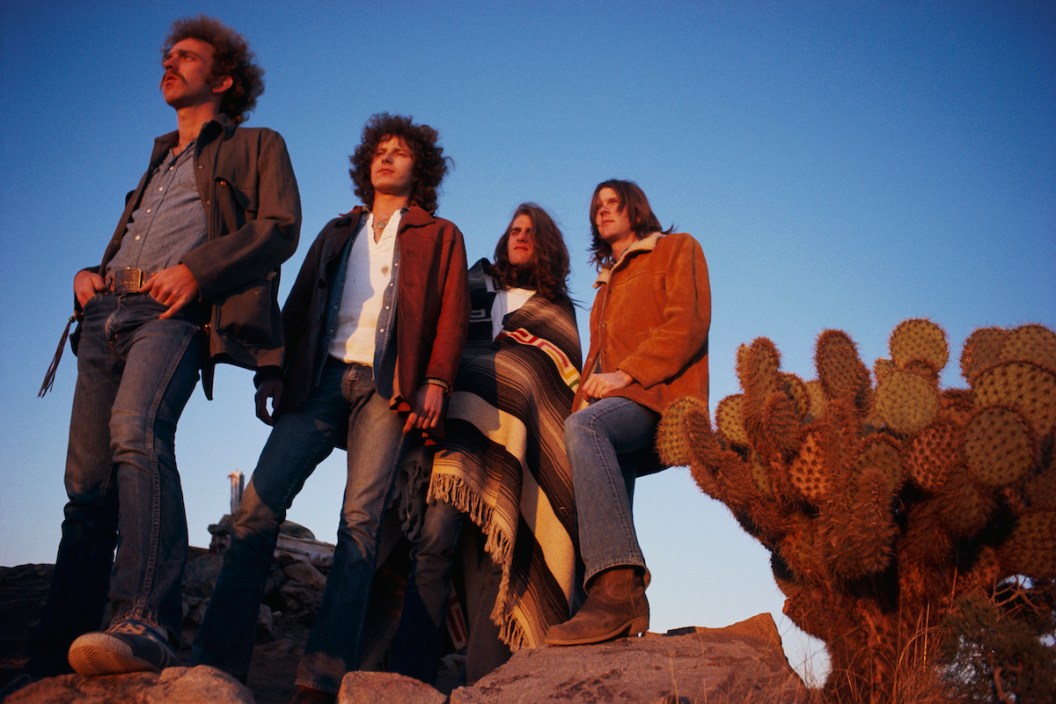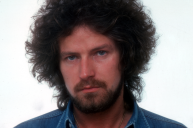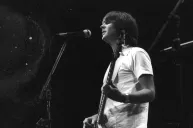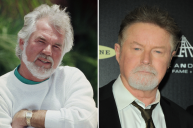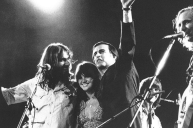Asylum Records forever changed the commercial viability and critical credibility of country and folk-inspired rock music with the June 1, 1972 release of the Eagles' self-titled debut album.
The Eagles began as a four-piece, with the group's nucleus over the years —drummer Don Henley and guitarist Glenn Frey— joined early on by two veterans of folk, country and bluegrass-inspired rock bands. Guitarist and banjo player Bernie Leadon came of age musically with country-rock pioneer Chris Hillman and joined his friend in the late 1960s as a member of the Flying Burrito Brothers. Bassist Randy Meisner brought traditional country instrumentation and high-harmony vocals to the mix following stints in Poco and Ricky Nelson's Stone Canyon Band. The original lineup began as Linda Ronstadt's Silk Purse-era backing band and made two albums together: its self-titled debut and 1973's Desperado. A fifth member, guitarist Don Felder, joined in time for 1974's On the Border.
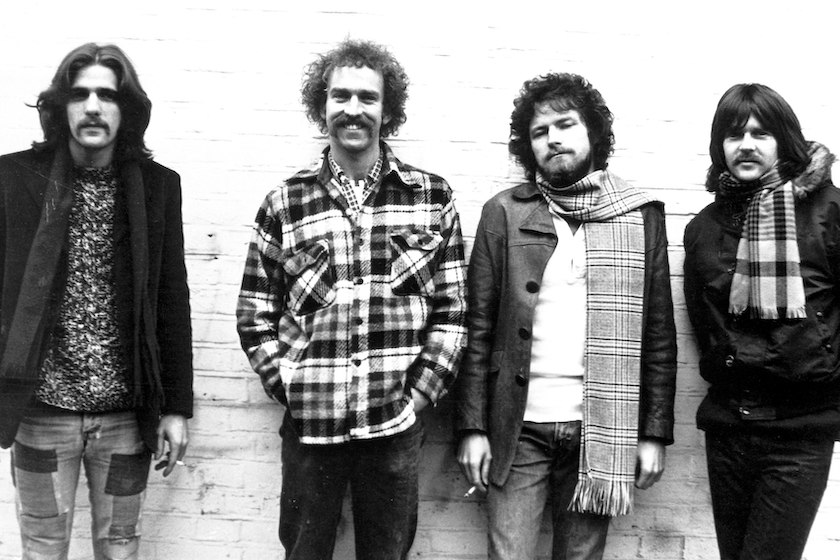
Gems/Redferns
Leadon left the band in 1975, with guitar rock virtuoso Joe Walsh filling in just in time for Hotel California. In 1977, Meisner got replaced in the Eagles by his replacement in Poco, Timothy B. Schmit.
Calling Henley and Frey the band's nucleus isn't meant to dismiss Leadon, Meisner or anyone else as bit players. After all, the best-selling album of all time (Their Greatest Hits (1971-1975)) bears the fruits of each original members' contributions to a band that requires musical proficiency as well as harmony and lead vocal versatility. As does the group's debut studio album, which elevates the four founding members' talents and reflects their prior experiences.
Producer Glyn Johns helped smooth out the Eagles' country-rock sound for its solo flight. Though he primarily built his Rock and Roll Hall of Fame resume alongside such rock heavyweights as Led Zeppelin, The Rolling Stones and The Who, Johns has a history of infusing country and folk-leaning music with pop-rock accessibility, as heard on albums he produced or engineered for Neil Young, Rita Coolidge and others.
Read on for a track-by-track breakdown of the first chapter of the Eagles' ongoing story— one that took the countrified elements from early band members' pasts mainstream.
"Take It Easy"
The Eagles' debut album and its singles discography both begin with this classic rock radio staple that put the band and Winslow, Ariz. on the pop cultural map.
Frey shares songwriting credit with neighbor and fellow West Coast country-rocker Jackson Browne for what remains one of the best showpieces of the band's multi-part harmonies and Leadon's double-time banjo-picking skills.
"Witchy Woman"
A minor-key takeoff of Native American music launches the Eagles' ethereal second single, making for one of the most instantly-recognizable intros in rock lore. Leadon started writing the song while in the Flying Burrito Brothers and completed it with Henley, who's in the spotlight for the first time as a lead singer and songwriter.
"Chug All Night"
Though it's far from groundbreaking lyrically, "Chug All Night" shouldn't be skipped in the digital age, if only because "Hotel California"-caliber guitar heroics interplay so majestically across three of Meisner's finest minutes as the Eagles' bassist.
"Most of Us Are Sad"
"Most of Us Are Sad" ranks up there with the Eagles' version of bluegrass tune "Midnight Rider" (off 1974's On the Border) when it comes to the best songs with Meisner on lead vocals that aren't titled "Take It to The Limit." It's a melancholic country-rock deep cut that's among Frey's finest efforts as a lyricist.
"Nightingale"
"Nightingale" got added to the tracklist late in the process at the behest of label boss David Geffen and Eagles manager Elliot Roberts because otherwise, "Witchy Woman" would've been the only song on the album with Henley on lead vocals. Thus, it's the only track recorded in Los Angeles and not in London at Olympic Studios. In the hands of the Eagles and Johns, a love song penned by Browne became a fast-driving change of pace that wraps up side A.
"Train Leaves Here This Morning"
In 1968, Leadon played on and co-wrote songs for The Fantastic Expedition of Dillard & Clark, a collaborative album by The Dillards member and Andy Griffith Show regular Doug Dillard and Byrds co-founder Gene Clark. The Eagles elevated this Leadon co-write from his Dillard & Clark days with its best asset: tight, gorgeous harmonies.
"Take the Devil"
Meisner wrote and sang this eerie soundscape that starts out as desolate as the album's cover, which was shot at the Joshua Tree National Park in California. The song's metaphysical feel makes it a companion piece of sorts to the better-known "Witchy Woman."
"Earlybird"
Leadon and Meisner co-wrote this fast-driving banjo tune about living each day to its fullest and feeling as free as a literal eagle. It's a stellar blend of the West Coast sound of the moment's building blocks: country storytelling, bluegrass precision and guitar rock brawn.
"Peaceful Easy Feeling"
Multiple essays could be written about what makes the third and final Top 25 pop single off Eagles a shoo-in for so many classic rock station's playlists and guitar teachers' playbooks. From a country fan perspective, "Peaceful Easy Feeling" holds up because it tells a universal story— a man's infatuated with a woman, but he knows he'll be fine in the long run if she doesn't return those feelings.
Frequent Eagles collaborator Jack Tempchin —a product of the same Los Angeles songwriter scene as Browne and J.D. Souther— wrote "Peaceful Easy Feeling" and co-wrote another definitive hit for the band, 1974's "Already Gone." It should come as no surprise that Tempchin's story-songs translated well to country music, getting cut by Emmylou Harris ("White Shoes"), George Jones ("Someone That You Used to Know") and Patty Loveless ("To Feel That Way at All").
"Tryin'"
It's tempting to oversimplify the early Eagles dynamic and classify Leadon and Meisner as country-leaning artists who broadened the musical horizons of rockers Henley and Frey. That's easy to dismiss after revisiting "Tryin'," a preview of guitar-slinging hard rock to come that's both written and sung by Meisner.
